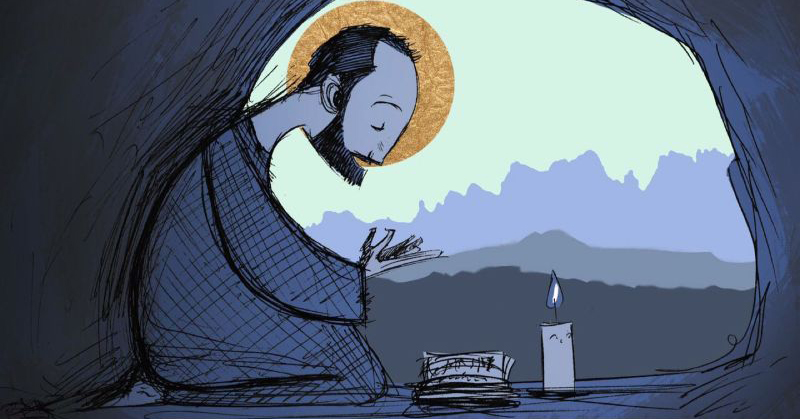
24 Mar March 2024 Reflection – Michael McFarland SJ
Jesuit Spirituality: Bringing Us All Together
In our recent video, Fr. David Nazar, SJ, the Rector of the Pontifical Oriental Institute, talks about the need for the Church to be a sign of unity in a fractured world. He says, “the world is in such a disarray of values and orientation, no one has the voice that is holding people together. And it is fundamentally the responsibility of the Church … to offer that voice that brings people together. So that’s really the challenge; and Jesuits are made for the challenge.”
He can say that because in the Spiritual Exercises of St. Ignatius, we Jesuits have the tools to be instruments of reconciliation and healing. The Exercises is generally thought of and used as a prescription for prayer; and it is that. But it is also much more: It defines a whole way of relating to the world and living a life centered on Jesus Christ and witnessing His boundless love for all people. Two recent experiences brought that home to me in a very powerful way.
Michele Murray, the Vice President for Student Affairs at the College of the Holy Cross, has an essay in Conversations on Jesuit Higher Education, on the so-called “Ignatian Presupposition” and how helpful it has been to her during this “particularly contentious period” on college campuses, including hers. She describes how she began carrying a pocket card summarizing its advice, which she would draw on during “difficult clashes of perspective.” The first part of the Presupposition states that “every good Christian ought to be more eager to put a good interpretation on a neighbor’s statement than to condemn it.” In other words, one should always assume good intentions in the other and look for what is valid in their position rather than focus on what seems wrong or contentious. Dialogue always begins with respect. The Presumption then goes on to say “if one cannot interpret it favorably, one should ask how the other means it.” That means sympathetic questioning and careful listening, being open to what the other has to offer, rather than thinking about how one can dispute it. The objective is to learn from the other, not to win the argument. Finally, if the other’s position still seems wrong, “one should correct the person with love.” Again, the emphasis is on being helpful and supportive in a common quest for the truth, not self-righteous or dismissive. Applying this approach requires and helps cultivate certain important virtues, including humility, generosity, “deep and attentive listening” and “questions for clarity and understanding.” Vice President Murray admits that this can be a real challenge in the conflictual environments we often face; but if it is pursued seriously, “The Presupposition opens the way to healthier relationships at home and at work, more effective collaboration and, perhaps, more imaginative problem-solving.”
My other experience of the impact of the Spiritual Exercises came when I attended a Summit sponsored by the Leadership Roundtable on young people in the Church. It brought together about 70 young professionals who are involved with the Catholic Church or Church-related organizations with a roughly equal-sized group of more senior leaders to speak about their experiences, hopes, dreams and concerns for the Church. The overarching theme was synodality; and much of the focus was on the process used to facilitate dialogue. Participants were assigned to round tables of eight, mixing people from various generations, interests and backgrounds. While there were several planned talks and panels for the whole assembly, much of the time was spent in small-group table conversations. These were conducted using a structured process that was also used at the Synod in Rome. It began with a period of silent prayer and reflection, as each participant considered the given question or prompt. Then the facilitator went around the table, inviting each participant to speak in turn, giving his or her reaction to the given theme, without any question, challenge or reaction from the others. This was followed by a second time around the table, where each one offered what he or she heard from the others. Finally there was a more open, freewheeling discussion, in which the group identified common themes that emerged from the individual reflections. This was all collected by the designated scribe, who reported it out to the larger gathering. This method was developed by the Jesuits for communal discernment based on the Spiritual Exercises, going back to the earliest deliberations of St. Ignatius and his companions, which led to their formation of the Society of Jesus. Through its emphasis on prayer, reflection and careful, empathetic listening, it is meant to transcend individual interests and biases while listening to the Spirit speaking in our hearts. It has proved to be effective in many different contexts, as it was at the Summit, as we learned to know and appreciate one another across our many differences and found common cause in our desire to make the Church more open, more welcoming, more just and more transparent.
These are just two examples of how the Spiritual Exercises, which is at the heart of all of our Jesuit institutions and works, can be a powerful force for unity and fidelity in the Church and the wider world.
Michael C McFarland, SJ
President, Gregorian University Foundation



